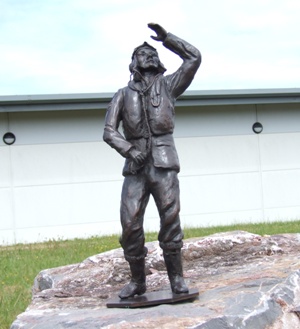The final funding promotion in support of the Exeter Airport Heritage Project will take place this Friday (26 August 2011) when a Hurricane and Spitfire of the Battle of Britain Memorial Flight along with a Lancaster pay a visit to Exeter.
The Project’s aim is to provide a statue to mark the part played by the airport during wartime. Supporters of the South West Airfields Heritage Trust, who are overseeing the scheme, will be joined by representatives of local government, the business community and airport management to witness the arrival of the historic aircraft. They will also inspect the maquette, a scale model of a WWII fighter pilot, meet the local artist responsible and visit the site where the final sculpture, which is in its final stages of construction, will be placed.

Funding in support of the project has so far been pledged by the Polish Air Force Association and Devon County Council, with generous donations from other groups and individuals. Additional funding is to be sought from sources including the Heritage Lottery Fund for the educational plinth and a circular paved area.
Robin Gilbert, representing the South West Airfields Heritage Trust said: “The Trust embarked upon the project back in 2007 and the most expensive part, the provision of the bronze statue, is now within our grasp. We are very grateful for individual and group contributions and we would especially like to express our thanks to the Polish Air Force Association for a most generous donation.”
Devon County Councillor Christine Marsh said: “It is right that Exeter and Devon commemorates the role that the airport played during WWII and the many international pilots based here who gave their lives for the protection of this country.”
It is the intention of the Exeter Airport Heritage Project to promote public awareness of the role played at the airfield during WWII by providing an informative plinth to protect the airfields heritage. The plinth will be topped with a bronze statue of a Battle of Britain Hurricane Pilot who will carry the rank of sergeant.
RAF Exeter played a major wartime role including the Battle of Britain with three fighter Squadrons taking part operated by pilots from many nations. During that brief period twenty-two pilots lost their lives. 1941 saw the arrival of Polish Squadrons who were to remain in occupation for over two years continuing the duties which included patrolling the southwest with night fighters, defending Exeter, Plymouth, its dockyards and those at Portland.


